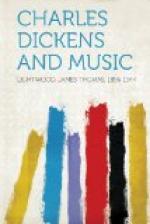BESIDE THAT COTTAGE DOOR, MR. BOFFIN (O.M.F.)
See p. 133.
BID ME DISCOURSE (S.B.T. 4)
Words adapted from Shakespeare’s Venus and Adonis.
H.R. Bishop.
BIRD WALTZ (D. & S. 29, 38)
Panormo.
A very popular piano piece of the pre-Victorian period.
BLACK-EYED SUSAN (A.N.), OR ALL IN THE DOWNS (P.P. 3)
Words by John Gay. R. Leveridge.
This song was printed in sheet form previous to 1730, in which year it appeared in Watts’ Musical Miscellany, Vol. IV., and was also inserted about that time in several ballad operas.
BOLD TURPIN VUNCE (P.P. 43)
Mr. Frank Kidson has pointed out that Sam Weller’s song is founded upon a ballad entitled ‘Turpin and the Bishop,’ which appears in Gaieties and Gravities, by one of the authors of Rejected Addresses. The author is said to be Horatio Smith. There is a good four-part setting of the words by Sir F. Bridge.
BRAVE LODGINGS FOR ONE (P.P. 29)
Original.
BRITISH GRENADIERS (B.H. 49)
The tune as we know it now is the growth of centuries, the foundation probably being a tune in The Fitzwilliam Virginal Book. The Grenadiers were founded in 1678. The second verse refers to ‘hand grenades,’ and the regiment ceased to use these in the reign of Queen Anne. The author is unknown.
BRITONS, STRIKE HOME (S.L.)
The well-known song in Purcell’s Bonduca gave its name to an opera by Charles Dibdin, published in 1803. This work probably suggested the phrase to Dickens. It was written with a view to arousing a patriotic feeling. The following verse occurs in the work:
When Dryden wrote and Purcell
sung
Britons, strike
home,
The patriot-sounds re-echoing
rung
The vaulted dome.
BUFFALO GALS (Letters)
See p. 10.
BY THE SAD SEA WAVES (Letters)
Julius
Benedict.
A once popular song from the opera The Brides of Venice.
CHEER, BOYS, CHEER (U.T. 29)
Words by Charles Mackay. Henry Russell.
Cheer! boys, cheer! no more of
idle sorrow—
Courage! true hearts shall bear us on our way,
Hope points before, and shows the bright to-morrow,
Let us forget the darkness of to-day.




